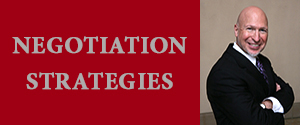

It is possible that after a good-faith attempt to engage another party in negotiation and problem solving, no progress is made. They may be insistent and demanding or unreasonable and uncompromising. They may just be unwilling to work jointly towards a solution or trying selfishly to impose their demands. In this situation, many of us avoid saying "no" even though we should. We become anxious about how the other may take it, and the defensiveness and anger that it may arouse. We may deal with this by avoiding the issue altogether and leaving the other party confused about where we stand. Or, even worse, we may say "yes" when what we really mean is "no".
Never concede to anything which is unacceptable just because of a fear of being assertive and saying "no". John F. Kennedy's famous statement: "Don't fear to negotiate but don't negotiate out of fear" is a good rule to remember in this situation.
Knowing how to say "no" constructively and positively is a skill that we all need in order to manage our relationships with authenticity and effectiveness. In this column, we provide a three-step formula for saying no while taking the negativity out of the "no!" and without even uttering the word.
Never concede to anything which is unacceptable just because of a fear of being assertive and saying "no". John F. Kennedy's famous statement: "Don't fear to negotiate but don't negotiate out of fear" is a good rule to remember in this situation.
Knowing how to say "no" constructively and positively is a skill that we all need in order to manage our relationships with authenticity and effectiveness. In this column, we provide a three-step formula for saying no while taking the negativity out of the "no!" and without even uttering the word.
No comments:
Post a Comment